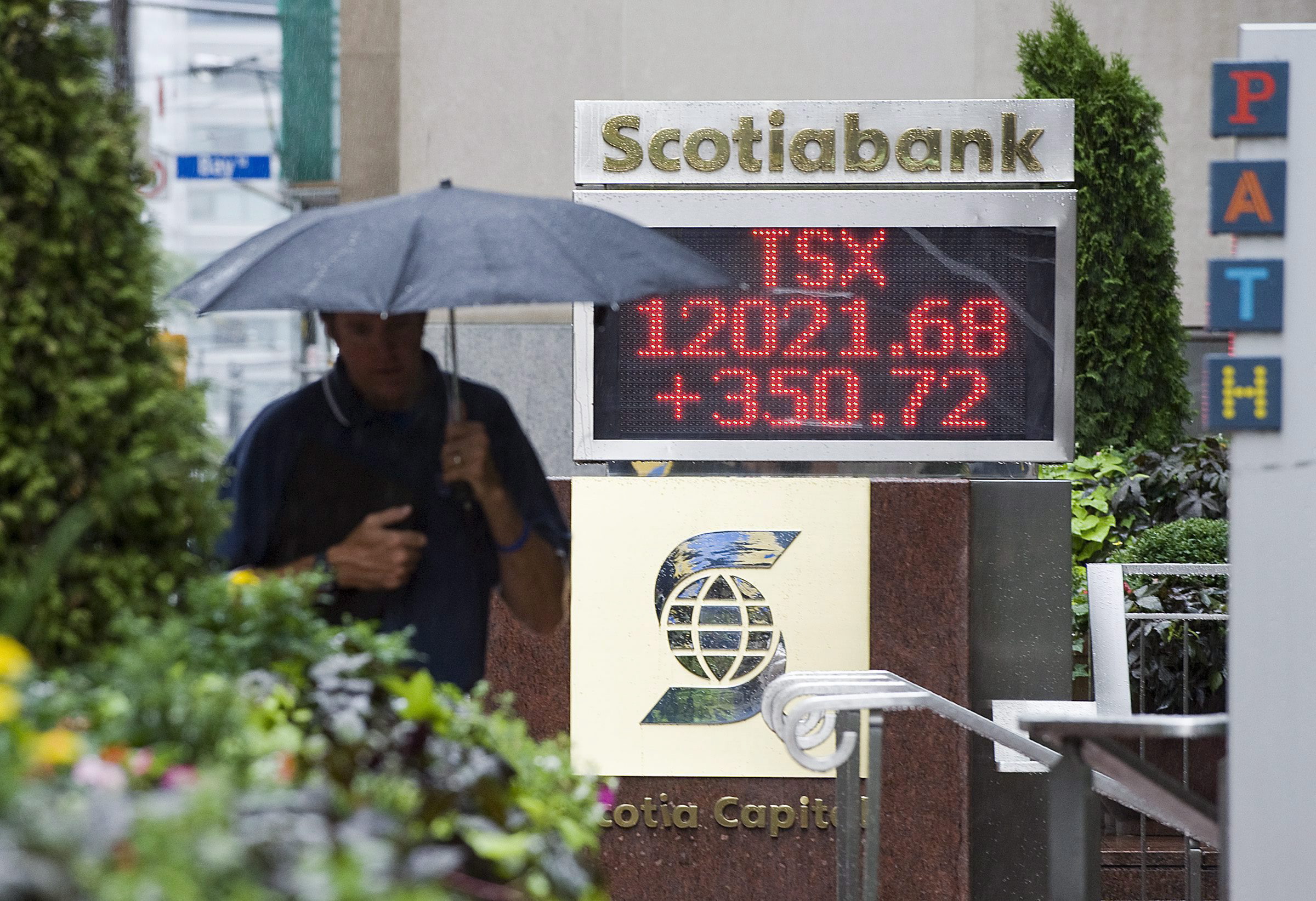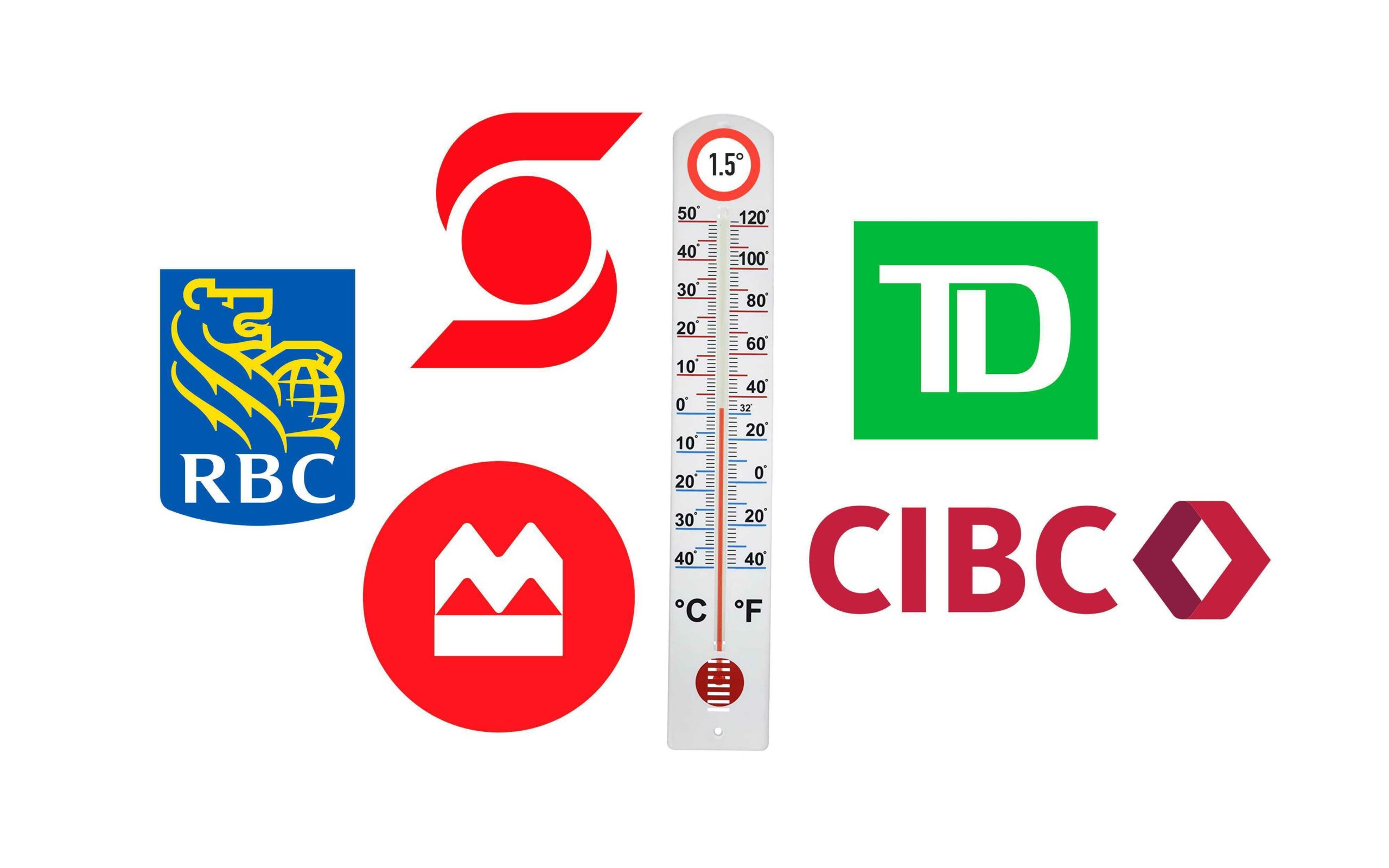
The site of an infamous B.C. mining disaster could get even bigger. This First Nation is going to court — and ‘won’t back down’
Xatśūll First Nation is challenging B.C.’s approval of Mount Polley mine’s tailings dam raising. Indigenous...
Three major Canadian banks and a powerful lobby group representing some 60 domestic and foreign banks have asked Canadian regulators to delay potential reforms that would require corporations to be more transparent about how the climate crisis may disrupt their operations and finances.
The banks’ pushback against the implementation of these reforms puts them in line with major oil and gas companies, many of whom also oppose new proposed climate financial transparency measures.
At the same time, the Bay Street opposition to key climate financial transparency measures appears to clash with a major public campaign launched by the big Canadian banks just last year.
Banks have been scrambling to publish climate reports outlining their plans to cut emissions and pressure their high-polluting clients to decarbonize, as part of a commitment they made in 2021 to a United Nations-convened net-zero banking campaign.
But their submissions to the regulators of Canada’s capital markets tell a different story.
The banks’ stance on climate transparency rules are among 130 submissions from a variety of industry and civil society stakeholders sent to regulators between October 2021 and February 2022.
Companies and organizations sent submissions in response to a proposal from securities regulators to require publicly listed companies on the stock market to publish information on how their management is assessing climate-related risks, as well as the metrics and targets they use when gauging the impact of climate change on their business plans.
Having this information would allow investors to make informed decisions about buying and selling stocks by reviewing which companies are most at risk from economic disruptions triggered by climate change and which ones are well-positioned to succeed in a warming planet.
But in the absence of this information, regulators of Canada’s capital markets warn that Canada’s economy will continue ballooning into a “climate bubble” that may suddenly explode in a disorderly manner.
Despite these warnings, an investigation by The Narwhal found two-thirds of companies and organizations that wrote to regulators in recent months were opposed to key climate financial transparency measures.
The opposition includes a prominent Bay Street lobby group, the Canadian Bankers Association, that represents the “big five” Canadian banks — TD Bank Group, Bank of Nova Scotia (Scotiabank), Royal Bank of Canada (RBC), CIBC and BMO Financial Group.

The bankers group has publicly praised the importance of transforming the financial system to tackle the climate crisis, declaring on its website that “Canada’s banks recognize the urgency of addressing climate change and understand that the financial sector is central to securing the transition to a low-carbon economy.”
But the group has also recommended regulators avoid new rules that would require companies to report information about how climate change will disrupt their operations under different planet-warming scenarios.
“We believe there is a risk of inadvertent and inaccurate disclosure during the early stages of development with results that may be too uncertain to be of value to investors,” it warned regulators in a letter.
The Canadian Bankers Association responded to questions from The Narwhal by sending a short email that included a 22-word statement, along with a message from spokesperson Mathieu Labrèche stating the lobby group would let the submission speak for itself.
“Climate change is a critical issue of our time and banks in Canada are committed to doing their part to address it,” Labrèche wrote.
The situation demonstrates how, after spending years financing fossil fuel development in Canada and abroad, banks are now trying to balance that legacy against the reality of climate change and evolving financial markets.
Scotiabank wrote in its March 15 Net-Zero Pathways Report that “additional efforts will need to be undertaken” to help lower the carbon pollution from its “oil producer clients.” Scotiabank acknowledged in its report that it stands to lose billions of dollars if the oil producers it supports can’t pay back the loans or other financial products the bank has offered them.
The bank’s report sets a target of cutting the emissions intensity from the burning of the oil and gas products it finances by at least 15 per cent by 2030, and cutting the emissions intensity from oil and gas operations by 30 per cent by 2030.

“Scotiabank recognizes the oil and gas sector as an important part of the bank’s net-zero strategy given the sector’s size and emissions profile,” the report stated. The bank also suggested a range of actions it could take, including investing in carbon-capture technology, to help achieve emissions cuts.
But just a month earlier, Scotiabank wrote to Canadian regulators recommending they not proceed with rules that would require companies to publish reports showing how the oil producers it finances would fare in different hypothetical carbon-constrained worlds.
Scotia Global Asset Management, a subsidiary of the bank, also wrote a letter to regulators recommending they hold off on requiring these reports be published because there are “significant practical challenges” faced by companies in compiling the information and a lack of standard methods to use.
The firm wrote that requiring reports on emissions from the use of a company’s products “seems excessive for the foreseeable future.” The bankers group also argued against rules that would force companies to publish the emissions generated when its products are burned or used, writing that much of the data needed to measure those emissions “is either of poor quality, or simply not available.”
Scotiabank declined to answer questions from The Narwhal about how its submissions to the regulator squared with its net-zero commitment, saying it had no further comment beyond what it had submitted.
BMO Global Asset Management and CIBC Asset Management, meanwhile, recommended in their own letters to regulators that companies should have the option of declining to publish their climate scenarios, if they instead write a note explaining why they cannot comply with the requirement.
BMO Financial Group’s 2021 Climate Report, published Feb. 28, commits to cutting emissions intensity by 33 per cent for its oil and gas portfolio by 2030 and to a 24 per cent cut to the emissions from burning oil and gas products by 2030. The bank wrote oil and gas decarbonization is a “critical element of the green transition.”
Less than two weeks earlier, BMO Global Asset Management wrote in a letter to Canadian regulators that, while it believed Canada should be “moving to mandatory disclosure” for scenario planning reports “over time,” companies should initially be given the option of avoiding this requirement because “there are still challenges” related to the procedures used to produce climate scenarios.
CIBC’s 2021 Sustainability Report, released earlier this month, says it is still developing its interim targets for its financed emissions and expects to publish a “climate transition roadmap” in a forthcoming net-zero report.

CIBC Asset Management’s January letter to regulators states the bank “would love” for regulators to require companies to report the emissions from the use of their products — but also raised concerns such data was “not easily available and is difficult to put together.”
The bank also asked regulators to be “cognizant of the financial impact or cost” to companies “from all this incremental disclosure.”
CIBC declined to answer questions from The Narwhal, while BMO did not respond to The Narwhal’s request for comment.
TD, which did not submit a letter to the regulators, said it would defer to the bankers association for comment. RBC, which also did not submit a letter to regulators, also declined to comment.
In their net-zero and climate reports, Scotiabank and BMO rejected the idea of kicking their high-polluting clients off their loan books.
Scotiabank’s net-zero report argues “divestment is among the least effective approaches to achieving a net-zero economy.”
The bank said divestment’s “impact on real-world emissions is questionable,” suggesting there was a “wide range of capital providers that can step in to replace any single bank’s financing.”
“Conversely, by continuing to support clients in emission intensive sectors, we can work with company leadership to enable and influence emission reducing initiatives — things that we could not do if we exit the banking relationship,” Scotiabank wrote.

BMO wrote in its climate report that it intended on “supporting the decarbonization efforts of our clients, rather than divestment strategies that we believe do not support emissions reduction in isolation.”
A strategy of divesting from oil and gas, BMO argued, would not support “real world emissions reductions” and could result in a “disorderly net-zero transition that does not address the economic and social needs of the communities affected.”
To date, Canadian financial reporting rules have not required climate transparency rules as stringent as regulators are now proposing. Regulators are responding to a growing chorus of pensions, asset managers, accountants, credit unions and other organizations that are demanding clear and reliable information on the climate-related risks Canadian companies are facing.
According to The Narwhal’s analysis, 20 firms or organizations told regulators they endorsed three key climate transparency measures that would force Canadian companies to demonstrate how the climate crisis could disrupt their business plans, report on the emissions from their products and submit to independent emissions audits.
One of those is Quebec-based Desjardins Group, the largest financial co-operative in North America with assets of roughly $400 billion. In a letter to regulators, Desjardins Group said investors can only identify polluting assets in their portfolios if they have the proper information to do so, and requiring more rigid transparency measures is the best way to achieve this.

Norges Bank Investment Management, the investment arm of Norway’s central bank that handles the Norwegian government’s global pension fund, also wrote to Canadian regulators recommending rules that would force companies to produce a scenario in which the world holds global average temperature increases to below 2 C above pre-industrial levels.
“It is good practice for companies to assess the sensitivity and resilience of their long- term profitability to different transition and physical climate scenarios, including a well-below two degrees Celsius scenario,” the central bank wrote, adding that companies should also disclose which climate scenarios they used, including detailed information about their analyses.
The Canada Post Corporation Pension Plan, one of Canada’s largest corporate-sponsored pensions with about $30 billion in assets, also wrote to regulators that all companies should be required to produce climate scenario planning — and that should include a scenario that limits global warming to 1.5 C.
Without stronger financial disclosure rules, it is impossible to know whether a company is truly aligned with the world’s climate goals, according to Barbara Zvan, the president and CEO of University Pension Plan, an Ontario-based fund with assets over $10 billion and serving about 35,000 members at University of Toronto, University of Guelph, Trent University and Queen’s University.

In a Feb. 11 interview with The Narwhal, Zvan said she feared delaying mandatory climate disclosures will leave the public in the dark and hinder investment managers’ ability to achieve climate-related targets.
In a letter, Zvan told financial regulators the pension plan wants to see many public companies, including all those in “high-emitting sectors,” required to undertake and reveal climate scenario planning within the next two years.
Zvan also wants to see a requirement for companies to reveal the emissions from their operations as well as from the products they make, if the information is considered “material,” or in other words, if a reasonable investor’s decision whether to buy, sell or hold things like stocks would likely be influenced if that information was left out, or if it was misstated. Mandatory audits on emissions reporting should also be phased in, she wrote.
“When you think about the industry, unless you tell them, ‘This is coming, and you’re going to need to do it,’ who’s going to invest the time and energy to do it?” Zvan told The Narwhal.
She said she understood how smaller institutions couldn’t tackle disclosures as easily as larger ones — and that’s why regulators need to start with simpler requirements and make them more complex over time.
“When most companies do something new, they often go to advisors. But no one’s going to build an advisory service unless they know they’re going to have clients,” Zvan said.
“They have to build certain capabilities, or for the larger institutions, build those capabilities internally, and you’ll never get it right the first time. So we need a few cycles to learn.”
Get the inside scoop on The Narwhal’s environment and climate reporting by signing up for our free newsletter. When I visited my reserve, Moose Factory,...
Continue reading
Xatśūll First Nation is challenging B.C.’s approval of Mount Polley mine’s tailings dam raising. Indigenous...

As the top candidates for Canada’s next prime minister promise swift, major expansions of mining...

Financial regulators hit pause this week on a years-long effort to force corporations to be...

